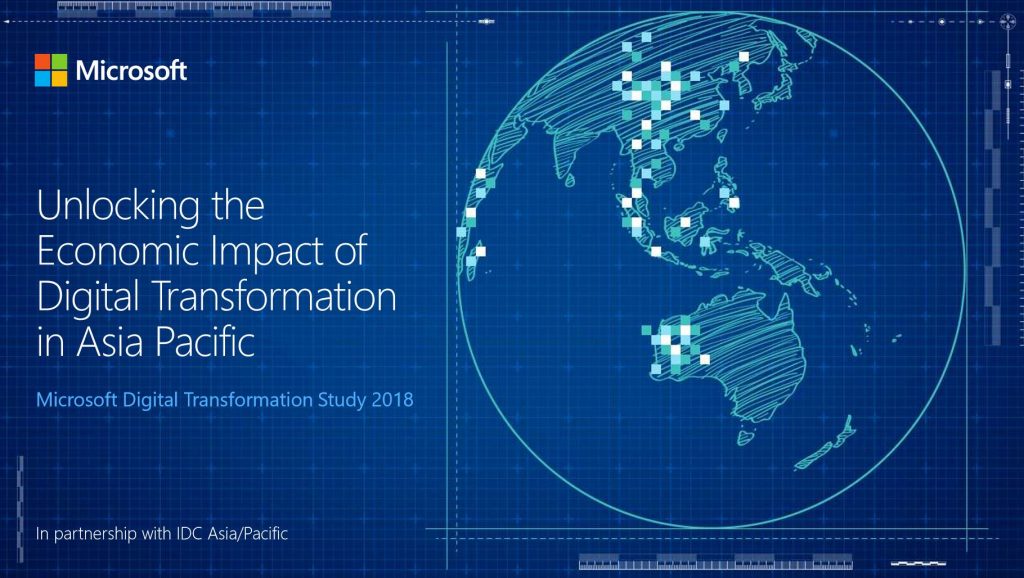
Digital Transformation to contribute $45 billion to Australia’s GDP by 2021
Lack of skills and resources plus siloed and resistant cultures main challenges facing organisations looking to transform
Sydney, Australia, 12 March 2018 – Digital transformation will add an estimated $45 billion to Australia’s GDP by 2021 and increase its growth rate by 0.5 per cent annually, according to a new study released today. The research, “Unlocking the Economic Impact of Digital Transformation in Asia Pacific[1]”, was produced by Microsoft in partnership with IDC Asia/Pacific.
While companies cited benefits of digital transformation including improvement in profit margin and productivity, as well as cost reduction and increased revenue from new products and services, they also highlighted some of the challenges facing organisations as they transform. These include a lack of skills and resources plus siloed organisations and cultures which are resistant to change.
“Australia is clearly on the digital transformation fast track. Within the next four years, we expect to see an additional $45 billion of Australia’s GDP derived from digital products and services,” said Steven Worrall, Managing Director, Microsoft Australia. “At the same time, organisations are increasingly deploying emerging technologies such as artificial intelligence as part of their digital transformation initiatives, which will accelerate growth even further.
“However, it’s important to note, transformation is about people as much as it is about technology. The top two barriers to digital transformation cited in the study are strongly anchored in an organisation’s ability to empower their people and transform their organisations to take advantage of the opportunity that digital transformation represents,” Worrall said.
The study echoes comments made by the Governor of the Reserve Bank of Australia last week who said that Australia’s future economy is likely to be built through investment in information technology and the skills in our labour force, rather than the natural resources which have been the backbone of the Australian economy for many years.
Jobs and skills a major focus as we transform our economy
According to the Australian business leaders surveyed, one of the societal benefits of digital transformation will be the creation of higher value jobs.
Respondents in Australia believe that 83 per cent of jobs will be transformed in the next three years due to digital transformation, with 54 per cent redeployed to higher value roles or reskilled to meet the needs of the digital age
“The rise of digital transformation will no doubt affect the labour market where many jobs will evolve and change. While it’s encouraging to see that 66 per cent of respondents are confident young professionals already have future-ready skills that will help them transition to new roles, organisations must focus on reskilling and upskilling those already in workforce who may not have the required skillset for the changing economy,” Worrall said.
Earlier this year, Microsoft launched its National Skills Program which focuses on helping people already in the workforce and disadvantaged groups most in danger of falling behind as the economy becomes increasingly technology-driven.
“Equipping the nation to succeed in the digital age – and ensuring all Australians benefit from it – must be a national priority if Australia is to remain competitive and maintain its record-breaking 26 years of economic growth,” continued Worrall. “Employers across all industries need to commit to helping workers prepare for the digital age. It is going to take a collective effort to ensure that no Australians get left behind and we each need to play our part in shaping and building Australia’s future-ready workforce.”
Microsoft advises that organisations relook at training and reskilling their workforces so that workers are equipped with future-ready skill sets such as complex problem solving, critical thinking and creativity. More importantly, they need to rebalance the workforce to attain and attract key digital talent, as well as be open in creating a flexible workforce model where they tap into a skills-based marketplace. From a digital skills perspective, LinkedIn’s latest study[2] outlines the ABCs of digital talents required for future economies in the region – artificial intelligence, big data and cloud computing. In Australia, the top in-demand skills are big data, mobile development, as well as user interface and experience design.
Unlocking the Economic Impact of Digital Transformation in Asia Pacific was conducted with 1,560 business decision makers – including 100 in Australia – in mid and large-sized organisations across 15 economies in the Asia-Pacific region.
More information about the study can be found here.
***
About Microsoft
Microsoft (Nasdaq “MSFT” @microsoft) is the leading platform and productivity company for the mobile-first, cloud-first world. Its mission is to empower every person and every organisation on the planet to achieve more.
For more information, please contact:
Microsoft Australia
Elizabeth Greene
For more inquiries on the findings of this report, please contact:
IDC Asia/Pacific
Daniel Zoe Jimenez
[1] Unlocking the Economic Impact of Digital Transformation in Asia Pacific conducted with 1,560 respondents in 15 markets:
- 15 Asia Pacific markets were involved: Australia, China, Hong Kong, Indonesia, India, Japan, Korea, Malaysia, New Zealand, Philippines, Singapore, Sri Lanka, Taiwan, Thailand and Vietnam.
- Business and IT leaders from organizations with more than 250 staff were polled.
- Industries polled included education, financial services, government, healthcare, manufacturing and retail.
- Respondents are decision makers involved in shaping their organizations’ digital strategy.
[2] LinkedIn, The Digital Workforce of the Future. Data as of August 2017.














